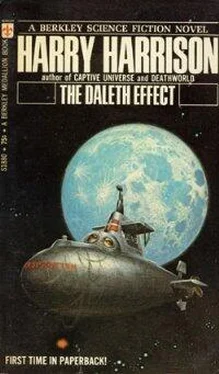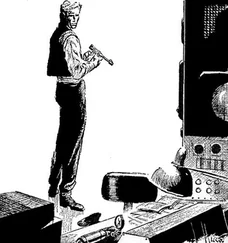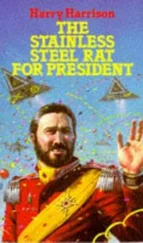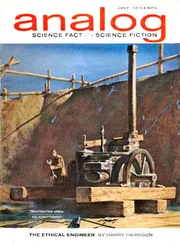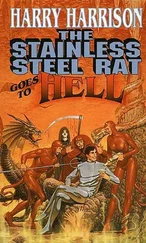“I am most loyal to your organization because it is the wisest arrangement for me. Speaking as a professional now, I can assure you that it is very difficult to got reliable intelligence information about the U.S.S.R. You have rigorous security procedures. Therefore I am tiappy for the items—I presume they are false—that you supply me for the Americans. They will never discover this because the CIA is hideously inefficient and has a one hundred percent record of never having ever been correct with intelligence information supplied to their own government. But they pay very well indeed for what they receive from me, and there are many fringe benefits.” He held up his cigarette and smiled. “Not the least of which is the money you pay me for revealing their little secrets. I find it a profitable arrangement. Besides, I like your organization. Ever since Beria…”
“Things have changed a great deal since Beria,” she said sharply. “A former SS man like yourself, an Oberst at Auschwitz has little claim to moral arguments.” When he did not answer she turned to look out of the window, at the long white building barely visible through the light rainfall. She pointed.
“There they are, Schmidt, just across the graveyard from us. There is something very symbolic in that, have you never thought?”
“Never,” he said emotionlessly. “You have far more insight into these matters than I have, tovarich Shirochenka.”
“Don’t ever forget that. You are an employee whom we watch very closely. Try to get closer to this Professor Rasmussen…”
She broke off as the door opened. A young man in his shirtsleeves hurried in and handed her a piece of paper that had been torn from the teleprinter. She scanned it quickly and her eyes widened.
“Boshemoi!” she whispered, shocked. “It can’t be true.”
The young man wordlessly nodded his head, the same look of numb disbelief on his face.
* * *
“How many hours now?” Arnie asked.
Ove looked at the chart hanging on the laboratory table. “Over two hundred fifty—and that is continuous operation. We seem to have most of the bugs worked out.”
“I hope to say you do.” Arnie admired the shining, cylindrical apparatus that almost filled the large work-stand. It was festooned with wires and electronic plumbing, and flanked by a large control board. There was no sound of operation other than a low and distant humming. “This is quite a breakthrough,” he added.
“The British did most of the groundwork back in the late sixties. I was interested because it related to some of my own work. I had been able to build up plasmas of two thousan‹ degrees, but only for limited amounts of time, a few thoi sand microseconds. Then these people at Newcastle on Tyne began using a helium-caesium plasma at fourteen hundred sixty degrees centigrade with an internal electric field. They were increasing the plasma conductivity up to a hundred times. I utilized their technique to build Little Hans here. I haven’t been able to scale up the effect yet, not practically, but I think I see a way out. In any case Little Hans works fine and produces a few thousand volts steadily, so I cannot complain.”
“You have done wonders.” Arnie nodded thanks as one of the laboratory assistants handed him a cup of coffee. He stirred it slowly, thinking. “Scaled up this could be the power source we need for a true space vessel. A pressurized atomic generator, of the type now used in submarines and surface craft, would fit our needs. No fuel needed, no oxidant. But with one inherent drawback.”
“Cooling,” Ove said, and blew on his hot coffee.
“Exactly. You can cool with sea water in a ship, but that sort of thing is hard to come by in space. I suppose an external radiating unit could be constructed…”
“It would be far bigger than the ship itself!”
“Yes, I imagine it would. Which brings us back to your fusion generator. Plenty of power, not too much waste heat to bleed off. Will you let me help you with this?”
“Delighted. Between us I know…” He broke off, distracted by a sudden buzz of conversation from the far end of the laboratory. “Is there anything wrong down there?”
“I’m very sorry, Professor, it is just the news.” She held up an early edition of BT.
“What’s happened?”
“It’s the Russians, that Moon-orbiting flight of theirs. It has turned out to be more than that, more than just a flight around the Moon. It is a landing capsule, and they have set it down right in the middle of the Sea of Tranquility.”
“The Americans won’t be overjoyed about this,” Ove said. “Up until now they have considered the Moon a bit of American landscape.”
“That’s the trouble.” She held the newspaper out to them, I19: eyes wide. “They have landed, but something is wrong with their lunar module. They can’t take off again.”
There was little more to the newspaper report, other than the photograph of the three smiling cosmonauts that had been taken just before take-off. Nartov, Shavkun, and Zlotnikova. A colonel, a major, and a captain, in a neatly organized chain of command. Everything had been very well organized. Television coverage, reporters, take-off, first stage, second stage, radioed reports and thanks to Comrade Lenin for making the voyage possible, the approach, and the landing. They were down on the Moon’s surface and they were alive. But something had gone wrong. What had happened was not clear from the reports, but the result was obvious enough. The men were down. Trapped. There for good. They would live just as long as their oxygen lasted.
“What an awful way to die, so faf from home,” the laboratory assistant said, speaking for all of them.
Amie thought, thought slowly and considered what had happened. His eyes went to the fusion generator, and when he looked back he found that Ove had been looking at it too, as though they both shared the same idea.
“Come on,” Ove said, looking at his watch. “Let’s go home. There’s nothing more to be done here today, and if we leave now we can beat most of the traffic.”
Neither of them talked as Ove pulled the car through the stream of bicycles and turned north on Lyngbyvej. They had the radio on and listened to the news most of the way to Charlottenlund.
“You two are home early,” Ulla said when they came in. She was Ove’s wife, a still attractive redhead, although she was in her mid-forties. While Arnie was staying with them she had more than a slight tendency to mother him, thinking he was far too thin. She took instant advantage of this unexpected opportunity. “I’m just making tea and I’ll bring you in some. And some sandwiches to hold you until dinner.” She ignored all protests and hurried out.
They went into the living room and switched on the television. The Danish channel had not come on the air yet, but Sweden was broadcasting a special program about the cosmonauts and they listened closely to this. Details were being released, almost grudgingly, by Moscow, and the entire tragedy could now be pieced together.
The landing had been a good one right up to the very end. Setdown had been accomplished in the exact area that had been selected and, until the moment of touchdown, it had looked perfect. But as the engines cut off one of the tripod landing legs had given way. Details were not given, whether the leg itself had broken or gone into a hole, but the results were clear enough. The lunar module had fallen over on its side. One of the engines had been torn free: an undisclosed quantity of fuel had been lost. The module would not be able to take off. The cosmonauts were down to stay.
“I wonder if the Soviets have a backup rocket that could get there?” Arnie asked.
Читать дальше
